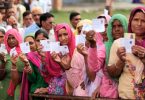India on Tuesday despatched the first shipment of 2,500 metric tonnes of wheat to Afghanistan via Pakistani land route as part of its humanitarian aid to Afghans reeling under food shortage since the Taliban seized power in Kabul last August.
In a ceremony at Amritsar, Foreign Secretary Harsh Vardhan Shringla along with Afghan Ambassador Farid Mamundzay and World Food Programme Country Director Bishaw Parajuli flagged off the first convoy of 50 trucks transporting the consignment through the Attari-Wagah border crossing.
India had sent a proposal to Islamabad on October 7 seeking the transit facility to send 50,000 tonnes of wheat to the people of Afghanistan via Pakistan. It received a positive response on November 24. Following this, both sides were in touch to finalise the modalities for the transportation of the shipment.
‘Each of the bags is stamped with the text: ‘Gift from the people of India to the people of Afghanistan’ in English, Pashto and Dari. On February 12, the Indian government had inked a Memorandum of Understanding (MoU) with the World Food Programme (WFP) for the distribution of wheat within Afghanistan.
“The shipment is part of the commitment made by the Government of India to supply 50,000 metric tonnes of wheat for the people of Afghanistan. The wheat assistance will be delivered in multiple consignments and will be handed over to the UN World Food Programme in Jalalabad, Afghanistan,” the Ministry of External Affairs (MEA) said.
“In this regard, the Government of India signed an agreement with the WFP for the distribution of 50,000 metric tonnes of wheat within Afghanistan,” it said in a statement. Expressing its gratitude to India and its people for the timely assistance at a time when the country was facing a food shortage, the Afghan embassy said the remaining consignments are expected to be shipped in a month.
“Truly an honour to witness the flagging off ceremony of India’s wheat assistance shipment to Afghanistan at Attari today; 50,000 metric tonnes or more than 2,500 trucks of wheat is one of the largest food contributions done by any country to support Afghanistan in this difficult hour,” Mamundzay tweeted.
The MEA said India decided to “gift” the wheat to the people of Afghanistan in response to appeals made by the United Nations for humanitarian assistance to that country. It said the supply will be carried out by the Food Corporation of India and transported from the Integrated Check Post (ICP) in Attari to Jalalabad in Afghanistan by Afghan transporters.
“An important milestone in India’s humanitarian assistance to the Afghan people. Today, India dispatched the first convoy of 2,500 MT of wheat assistance from ICP Attari to Jalalabad, Afghanistan,” MEA spokesperson Arindam Bagchi tweeted. The foodgrains being delivered are of Rabi Market Season 2020-21 in 50-kg jute bags and the shelf-life of the wheat is a minimum of one year from the date of dispatch.
It is learnt that fumigation of the consignment has been undertaken before handing over for transportation to cater for long passage time.
The MEA said India remains committed to its special relationship with the people of Afghanistan. “In this endeavour, India has already supplied 5,00,000 doses of Covaxin, 13 tonnes of essential life-saving medicines and 500 units of winter clothing. These consignments were handed over to the World Health Organisation and the Indira Gandhi Hospital, Kabul,” it said.
The last consignment of medical supplies was delivered on Saturday. It was the fifth consignment of humanitarian aid to that country.
India has been pitching for providing unimpeded humanitarian aid to Afghanistan to address the unfolding humanitarian crisis in the country. It has not recognised the new regime in Afghanistan and has been pitching for the formation of a truly inclusive government in Kabul besides insisting that Afghan soil must not be used for any terrorist activities against any country.
India has been concerned over the recent developments in Afghanistan. It hosted a regional dialogue on Afghanistan on November 10 that was attended by NSAs of Russia, Iran, Kazakhstan, Kyrgyzstan, Tajikistan, Turkmenistan and Uzbekistan.
The participating countries vowed to work towards ensuring that Afghanistan does not become a safe haven for global terrorism and called for the formation of an “open and truly inclusive” government in Kabul with representation from all sections of the Afghan society.







